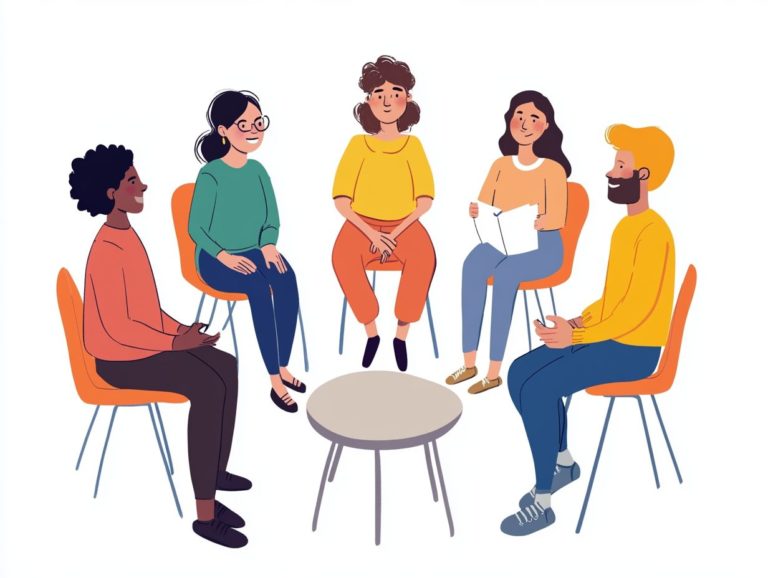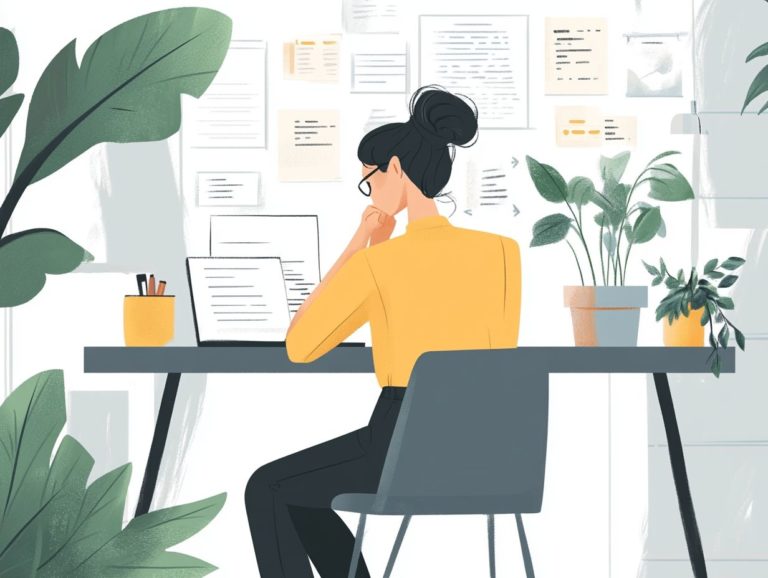Exploring the Psychology of Limiting Beliefs
Limiting beliefs have the power to hold you back from reaching your full potential, influencing your thoughts, behaviors, and, ultimately, your life. These deeply ingrained ideas often originate from past experiences, creating barriers to both success and happiness.
This article delves into what limiting beliefs are, how they impact your life, and offers practical tools to identify and challenge them. You’ll explore common triggers and the process of transforming these beliefs into empowering ones. You’ll also see how therapy can facilitate this transformative journey.
Join in to uncover the psychology behind limiting beliefs and discover effective strategies to break free from their constraints.
Contents
- Key Takeaways:
- Understanding Limiting Beliefs
- The Impact of Limiting Beliefs
- Identifying and Challenging Limiting Beliefs
- Exploring the Root Causes of Limiting Beliefs
- Changing Limiting Beliefs to Empowering Beliefs
- The Role of Therapy in Addressing Limiting Beliefs
- How Therapy Can Help in Overcoming Limiting Beliefs
- Frequently Asked Questions
Key Takeaways:

- Limiting beliefs are negative thoughts that hold us back from reaching our full potential.
- These beliefs can impact our thoughts and behaviors, leading to self-doubt, fear, and a lack of confidence.
- With self-awareness, challenging techniques, and therapy, we can identify and overcome limiting beliefs, replacing them with empowering beliefs for personal growth and success.
Understanding Limiting Beliefs
Understanding limiting beliefs is essential for your personal growth and happiness, as these beliefs greatly influence your perceptions of yourself, your capabilities, and the world around you.
These limiting beliefs can stem from childhood experiences, past traumas, or societal influences. They create mental barriers that prevent you from fully realizing your potential.
By identifying and confronting these beliefs, you can help you build a life that matches your goals. This ultimately leads to positive outcomes in both your personal and professional life.
Definition and Characteristics
Limiting beliefs are those nagging convictions that distort how you perceive yourself and the world around you. They often lead to self-sabotage and emotional turmoil.
They manifest as rigid thoughts about your capabilities or the nature of your environment, erecting barriers to your personal growth and fulfillment. Typically rooted in past experiences or societal pressures, these beliefs can trick you into thinking you re unworthy of success, love, or abundance.
This negativity can trap you in a cycle of failure, where you subconsciously act in ways that reinforce those limiting convictions. The emotional burden of these beliefs can generate anxiety and discontent, impacting your relationships and overall well-being.
Recognizing and challenging these thoughts is crucial for cultivating a healthier mindset. It enables you to embrace a more positive outlook on life.
The Impact of Limiting Beliefs
Limiting beliefs profoundly shape your thoughts, behaviors, and emotional connections, often giving rise to negative notions that obstruct your journey toward happiness and success. Learning how to challenge your limiting beliefs can be a transformative step in overcoming these obstacles.
Consider how a belief formed in the innocent days of childhood can morph into an Enthusiasm Thief, standing in the way of your childhood dreams or future aspirations. These beliefs linger and actively color your interpretation of reality, creating cognitive dissonance the discomfort you feel when your beliefs don’t match your reality that stifles personal growth and complicates your ability to overcome challenges.
How They Affect Our Thoughts and Behaviors
Limiting beliefs have a profound impact on your thoughts and behaviors, often distorting your self-awareness and cognitive processes. Learning how to identify limiting beliefs can help you overcome these mental barriers.
This distortion can lead you to act in ways that align with those negative beliefs. These underlying misconceptions can create a relentless cycle of self-doubt.
Making it increasingly challenging for you to access your inherent strengths, such as resilience and confidence, when emotional attachments to these beliefs go unchecked.
They can surface as behaviors that reinforce feelings of inadequacy, thus perpetuating a negative mindset.
Recognizing these thought patterns is essential for your personal development. It allows you to shift toward healthier perspectives and cultivate a more positive self-image.
By challenging those limiting beliefs, you can foster a greater sense of enablement and significantly enhance your emotional well-being.
Identifying and Challenging Limiting Beliefs

Identifying and challenging your limiting beliefs is a crucial step on the path to self-discovery and personal growth. This process enables you to break free from mental barriers and understand the link between limiting beliefs and anxiety, allowing you to reframe your belief system.
Utilizing various tools and techniques, such as cognitive-behavioral therapy, can greatly assist you in this endeavor. Through inquiry and self-reflection, you can uncover the origins of those self-limiting beliefs, setting you on a transformative journey toward positive outcomes and a healthier, more enabled mindset.
Tools and Techniques for Recognizing and Overcoming Them
Effective tools and techniques for recognizing and overcoming those pesky limiting beliefs include practices like cognitive-behavioral therapy, journaling, and thought reframing. These methods invite you to engage in introspection, helping to uncover the underlying narratives that may be holding you back from personal progress. To dive deeper, you can explore how to transform your mindset.
For example, cognitive-behavioral therapy exercises often guide you in identifying negative thought patterns and systematically challenging them. This paves the way for healthier mental frameworks.
Journaling is also a powerful self-discovery tool, allowing you to articulate your fears and aspirations, thereby clarifying your personal goals. Thought reframing encourages you to shift your perspective, transforming limiting beliefs into enabling affirmations.
Dive deep into self-inquiry to dismantle barriers and cultivate a growth mindset, ultimately paving the way for transformative change.
Exploring the Root Causes of Limiting Beliefs
Delving into the root causes of your limiting beliefs uncovers valuable insights into the patterns and triggers that shape your belief system. To learn more about this process, check out how to identify your limiting beliefs, as these are often rooted in past trauma or formative childhood experiences.
These beliefs can quietly sabotage your childhood dreams and future aspirations. They operate beneath your conscious awareness and influence how you perceive reality and your own capabilities.
Grasping these origins is crucial for dismantling the mental barriers that obstruct your personal growth and happiness.
Common Patterns and Triggers
Common patterns and triggers for limiting beliefs often stem from societal expectations, personal fears, and emotional attachments that shape your identity.
These factors not only influence how you perceive your own potential but also create a feedback loop that reinforces negative beliefs. This ultimately stunts your personal growth.
For example, the weight of community beliefs can magnify feelings of inadequacy, weaving a narrative that undermines your self-worth. When you internalize these external pressures, the emotional toll can be significant, potentially leading to anxiety or depression.
Recognizing these patterns is crucial for breaking free from self-imposed limitations, paving the way for a healthier mindset and a more fulfilling life trajectory.
Changing Limiting Beliefs to Empowering Beliefs
Transforming limiting beliefs into enabling ones is an exciting journey that can change your life! It hinges on self-awareness and the art of reframing your thoughts. By identifying the thought errors that fuel negative beliefs, you can create a blueprint for a reality that fosters happiness and success, drawing on strategies from overcoming limiting beliefs: a holistic approach.
This shift demands a dedication to personal growth and a deep understanding of how your beliefs shape your life. Embrace the process, and you ll find that your mindset can be your greatest ally.
Ready to start challenging your limiting beliefs? Join our workshop today!
Strategies for Replacing Negative Thoughts with Positive Ones

Strategies for replacing negative thoughts with positive ones include techniques like reframing, affirmation, and visualization, all designed to foster your self-discovery and personal growth.
By actively engaging in these approaches, you can cultivate a mindset that embraces optimism and resilience.
Reframing allows you to shift your perspective on challenging situations, turning perceived failures into valuable learning opportunities. Similarly, using affirmations helps you challenge deep-seated beliefs, replacing doubt with unwavering confidence.
Visualization is a powerful tool that enables you to vividly imagine your desired outcomes, reinforcing your commitment to your goals. These strategies improve your mental health. They also enhance self-awareness and lead to a more fulfilling life.
The Role of Therapy in Addressing Limiting Beliefs
Therapy is a game changer in breaking down those limiting beliefs, offering you structured support and effective therapeutic techniques.
Approaches like a type of therapy that helps change negative thinking patterns enable you to confront and transcend emotional stress, guiding you toward a more liberated mindset.
How Therapy Can Help in Overcoming Limiting Beliefs
Therapy can be a powerful ally in your journey to overcome limiting beliefs, employing techniques like a type of therapy that helps change negative thinking patterns to enhance self-awareness and challenge those pesky cognitive distortions.
In a nurturing environment, you have the opportunity to delve into your thoughts and feelings, unraveling the deeply entrenched narratives that often stand in the way of your personal growth.
These sessions provide a structured space for you to confront your inner critic and identify patterns of negative thinking, allowing you to reshape those beliefs into healthier ones.
As you engage in this transformative process, you’ll likely discover a newfound resilience and heightened emotional intelligence. The insights gained through therapy enable you to tackle life s challenges with confidence and foster a deeper sense of identity and purpose, paving the way for holistic self-improvement.
Frequently Asked Questions
-
What are limiting beliefs?
Limiting beliefs are negative thoughts or attitudes that hold us back from reaching our full potential. They often stem from past experiences or societal influences and can limit our abilities and opportunities.
-
How do limiting beliefs affect us?
Limiting beliefs can affect us in many ways, such as causing self-doubt, fear of failure, and a lack of confidence. They can also prevent us from taking risks and trying new things.
-
Why is it important to explore the psychology of limiting beliefs?
Exploring the psychology of limiting beliefs can help us understand where these beliefs come from and how they impact our thoughts and behaviors. Additionally, learning about the science behind limiting beliefs can provide the self-awareness needed to challenge and overcome them.
-
What are some common examples of limiting beliefs?
Some common limiting beliefs include “I’m not good enough,” “I don’t deserve success,” “I’ll never be able to change,” and “I’m too old/young to pursue my dreams.” These beliefs can vary from person to person and can be deeply ingrained in our minds.
-
How can we overcome limiting beliefs?
One way to overcome limiting beliefs is by consciously challenging them and replacing them with more positive and realistic thoughts. Seeking support from a therapist or coach can also be helpful in identifying and addressing these beliefs.
-
Can limiting beliefs be beneficial?
While limiting beliefs can hold us back, they can also serve as a form of protection. For example, the belief “I’m not good enough” may prevent us from taking on tasks or challenges that we are not ready for. However, it’s important to distinguish between healthy caution and limiting beliefs that hinder our growth and potential.
Explore the psychology of limiting beliefs now to unlock your true potential!





